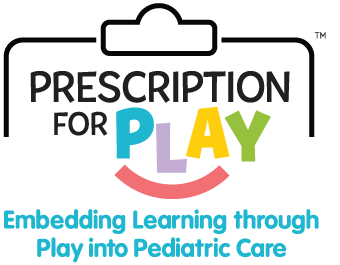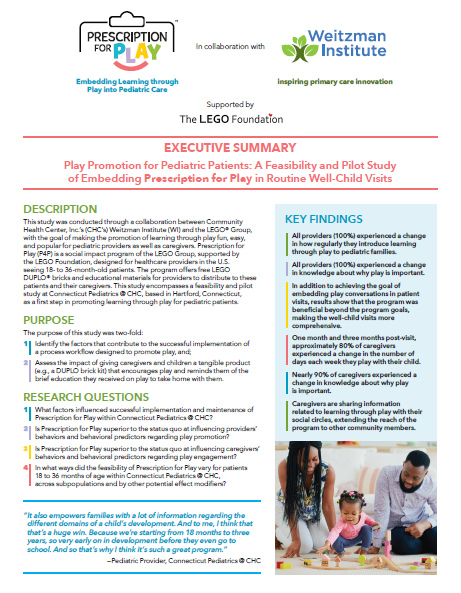About Prescription for Play

Amidst the COVID-19 pandemic, addressing the mental health needs of young children is more important than ever.
The Weitzman Institute is proud to partner with The LEGO® Group to support its Prescription for Play (P4P) program.
Prescription for Play is a social impact program of The LEGO® Group, supported by The LEGO® Foundation.
What is Prescription for Play?
Prescription for Play promotes learning through play by supplying free DUPLO® brick kits and educational materials to pediatric health care providers to deliver to 18-36-month-old patients during routine well-child visits.
Program resources include (free of charge):
- LEGO® DUPLO® brick kit
- Education Materials
- Virtual Hub of Program Resources and Trainings
- Implementation Toolkit (Manual, Sample Workflows and Scripts)
- CME Credits
- Technical Assistance
- Enduring Educational Content
- Program Support
Create a free account to get started.
Create My AccountResearch Findings
Play Promotion for Pediatric Patients: A Feasibility and Pilot Study of Embedding Prescription for Play in Well-Child Visits
The Weitzman Institute conducted a pilot and feasibility study at Connecticut Pediatrics @ CHC in Hartford, Connecticut to:
- Identify the factors that contribute to the successful implementation of a process workflow designed to promote play; and
- Assess the impact of giving caregivers and children a tangible product (e.g., a LEGO® DUPLO® brick kit) that encourages play and reminds them of the brief education they received on play to take home with them.
- All providers (100%) experienced a change in how regularly they introduce learning through play to pediatric families.
- All providers (100%) experienced a change in knowledge about why play is important.
- In addition to achieving the goal of embedding play conversations in patient visits, results show that the program was beneficial beyond the program goals, making the well-child care visit more comprehensive.
- One month and three months post-visit, approximately 80% of caregivers experienced a change in the number of days each week they play with their child.
- Nearly 90% of caregivers experienced a change in knowledge about why play is important.
- Caregivers are sharing information related to learning through play with their social circles, extending the reach of the program to other community members.

Download the Executive Summary